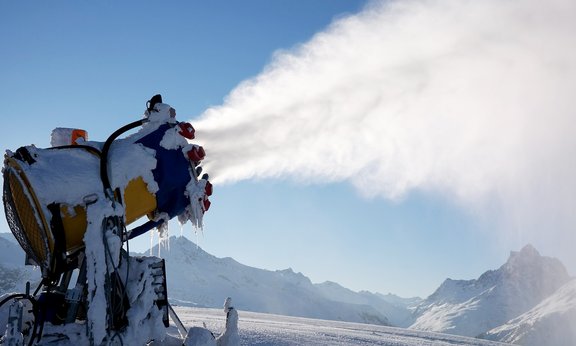Natural snowfall is increasingly lacking during winter, even in alpine regions. Geographer and economist Robert Steiger from the Department of Economics at the University of Innsbruck, together with Canadian researchers, has investigated whether snowmaking is a maladaptation in terms of resource consumption and CO2 emissions. “Sustainability of ski tourism is highly dependent on resource consumption and emissions,” says Robert Steiger. “We studied water and energy consumption and the resulting CO2 emissions of the ski industry in Canada. The results can also be transferred to the situation in Central Europe.”
Significantly more artificial snow needed in the future
The first national study to assess the impact of artificial snowmaking shows the scale of this development. In Canada alone, the annual energy consumption of nearly 17,000 households is required to produce an estimated 42 million cubic meters of machine-made snow in an average winter. This results in about 130,000 metric tons of CO2 annually.
As more snow needs to be produced in a warming climate, the demand for water and energy will continue to increase, even as average ski seasons become shorter in the coming decades. In Canada, according to the study in the journal Current Issues in Tourism , snowmaking demand will increase between 55% and 97% by 2050. In Austria, extra demand by 2050 ranges from +62 to +105%, depending on the climate scenario assumed. This is shown by earlier studies of the team led by Robert Steiger. Water and energy demand will increase proportionally with the snow produced.
Emissions strongly depend on energy source
“The extent of emissions from artificial snowmaking depends to a large extent on the energy used,” emphasizes Robert Steiger. “If we take the average emissions of our current electricity mix in Austria, around 200 g of CO2 per kilowatt hour are released. When green electricity is used, CO2 emissions drop to 10 g per kilowatt hour.”
To increase the sustainability of snowmaking, and thus skiing, the researchers call for a joint initiative by ski area operators, policy makers, environmental organizations, and skiers to develop comprehensive policies and practices that prioritize sustainability in addressing the challenges posed by climate change and its associated impacts on snowpack. “This includes encouraging innovation and investment in energy-efficient snowmaking technologies, promoting water conservation measures, and accelerating the transformation to renewable energy sources,” emphasizes Robert Steiger.
Comprehensive perspective remains crucial
For an evaluation of whether snowmaking helps to reduce total tourism emissions, the overall picture of the ski industry must be assessed. For example, it plays a role whether skiers move to more distant, snow-reliable ski areas if skiing is no longer possible at lower altitudes. In addition, whether snowmaking can contribute to the sustainability of a ski area also depends heavily on the local conditions in each case. “Winter sports are of great importance to the economy in many regions of our country,” says Robert Steiger. “We must therefore do everything we can to ensure that skiing operations are as sustainable as possible. Vigorously driving forward the decarbonization of our energy supply can make an important contribution,” emphasizes the scientist, who also sees a need for further research in the future: “For a truly sustainable strategy, a comprehensive analysis is absolutely essential.”
Publication: Sustainability of Snowmaking as Climate Change (mal)Adaptation: An Assessment of Water, Energy, and Emissions in Canada's Ski Industry, Current Issues in Tourism (2023). DOI: 10.1080/13683500.2023.2214358


